Old age allowance a right, not charity
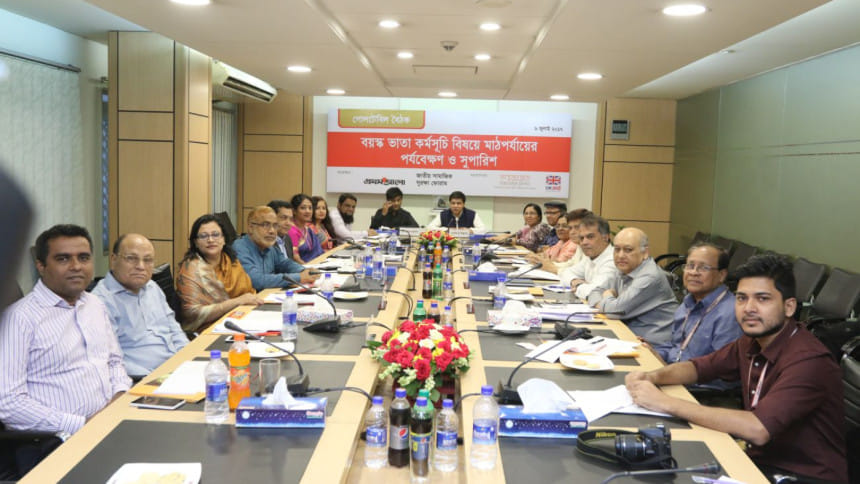
On July 9, 2017 National Forum for Social Protection (NFSP) and Manusher Jonno Foundation with the support of the Department for International Development (DFID) Bangladesh organised a roundtable on field level observations and proposals on the old age allowance programme. Here we publish a summary of the discussion.
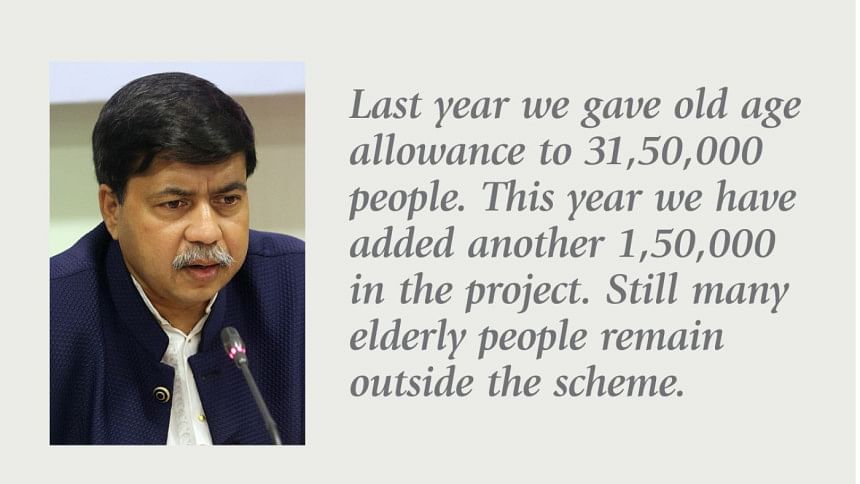
Habib-e-Millat MP, Member, Parliamentary Standing Committee on the Ministry of Social Welfare
Globally, the number of aged persons is growing rapidly. During the 70s the average lifespan of Bangladeshi people was less than 50 which has now increased to 70. So now we are faced with a large number of aged populations that we need to take care of. Again, the joint family structure is now transforming into single or nuclear family. As a result the issue of taking care of the elderly members of the family has become crucial and the government has a big role to play here. Our Hon'ble PM Sheikh Hasina introduced the old age allowance project during her first term. At that time the eligible age for women was 62 years and for men it was 65 years. At that time 403,011 persons were covered under the old age allowance scheme. They used to get Tk 100 per month. At present the amount has been increased to Tk 500 and the total budget for the project now amounts to Tk 2,100 crore. Last year we gave old age allowance to 31,50,000 people. This year we have added another 1,50,000 in the project. Still many elderly people remain outside the scheme. The allowance amount is also not adequate. But the government is fully aware of it. Despite its limited financial capacity the government is trying to provide more facilities to the senior citizens of the country.
I believe a good number of suggestions will come from the panellists about how we can make the old age allowance scheme more effective. We will communicate these messages to the policymakers and will discuss these issues in the parliamentary committee on social security programmes.

Shaheen Anam, Executive Director, Manusher Jonno Foundation & Co-Convenor, NFSP
We ran a three-year project targeting the whole process of old age allowance disbursement from selection point up to payment and distribution. The project was supported by DFID. Through this project some effective citizens group/ forums have been established at the grassroots level. We worked with twelve partner organizations under this project. Our aim was to understand general people's perception about Government's social security programs existing management and identify the gaps that need to be addressed to make the program more effective.
This project has been received extremely well by the people at the grassroots. Our local government authorities and local administration have also welcomed this project. This is indeed a great initiative of the government. If this project can be managed properly it will be a great success for the government. Through our project we have tried to collect evidence of how this old age allowance programme has been implemented at the grassroots level. We have formed social protection forums up to the union level under the National Forum for Social Protection. Though our local partners are involved in facilitating these forums, the latter is a result of the voluntary efforts of the local people, especially the beneficiaries. We have also strengthened the grievance redress system (GRS). In every government office there is GRS. But in many cases this mechanism remains inactive. We did two pilot projects of GRS in Mithapukur upazila of Rangpur and Kazipur upazila of Sirajganj. In Mithapukur the project was about VGD and in Kazipur the project was aimed at old age allowance. We have been able to resolve many complaints through this pilot project. The government has appreciated these efforts and has asked to carry out more such projects to strengthen the social security programmes. We used social accountability tools such as community score card, social audit, citizen charter to create a link between the general people and government service providers. We have found that open engagement helps to resolve many issues effectively. We have also conducted research and carried out socio-economic household census in two unions with the support of BARD. This project has helped a lot to support the National Social Security Strategy. A technical committee has been formed in the Cabinet Division which has developed an online GRS. We are a member of this committee. Our targeting system needs to improve a lot. There is also a need for more budgetary allocation in the old age allowance scheme.
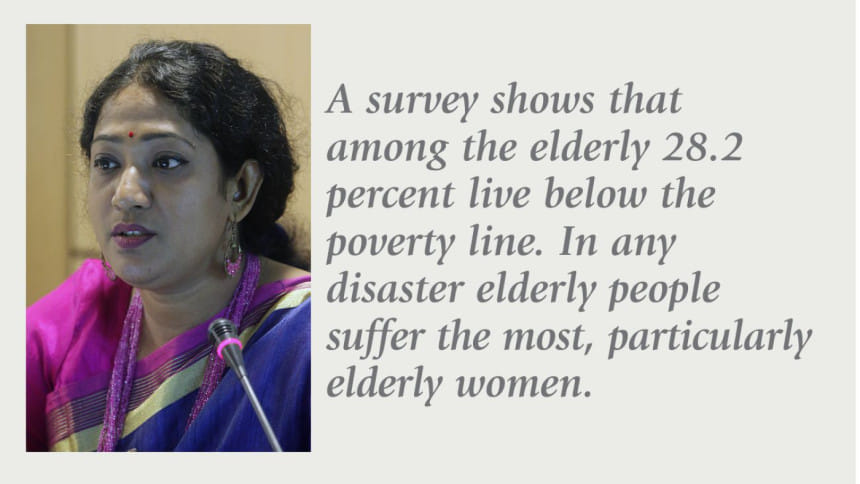
Shoma Datta, Deputy Program Manager Manusher Jonno Foundation
Currently, around eight percent of the population is above 60 years of age, and this percentage is growing. By 2030 it will become 12 percent. A survey shows that among the elderly 28.2 percent live below the poverty line. In any disaster elderly people suffer the most, particularly elderly women. A baseline survey conducted by Manusher Jonno Foundation reveals that the eligibility criterion related to age was not followed in the cases of 18 percent male beneficiaries and 12 percent female beneficiaries of old age allowance scheme. Hence, National Identity Card should be made compulsory for identifying the age of the beneficiaries.
Although, in many cases, an elderly person's individual income may be poor his or her family income is quite good. That's why family income of elderly persons need to be calculated along with their individual income.
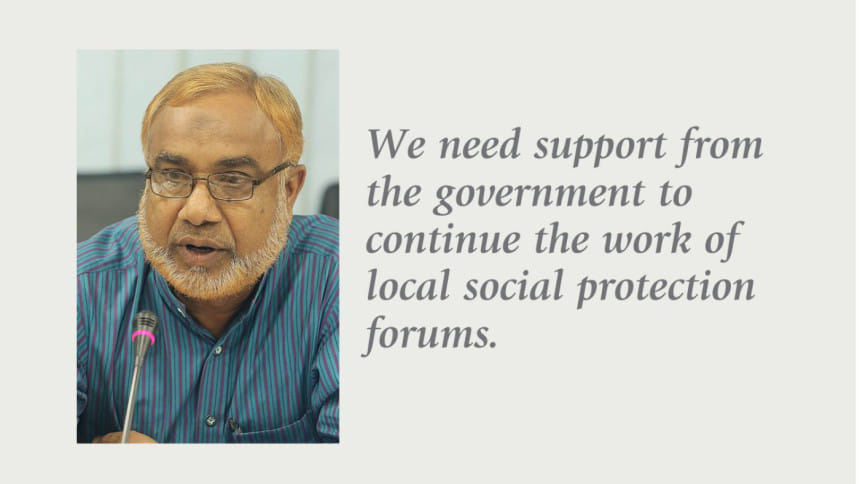
Mohammad Alauddin Khan, Executive Director, NDP & Member, NFSP
We formed social protection forums at the grassroots level under this project. The project is now over. But the importance of monitoring through participation of the local people still resonates with the locals. That's why we need support from the government to continue the work of local social protection forums.
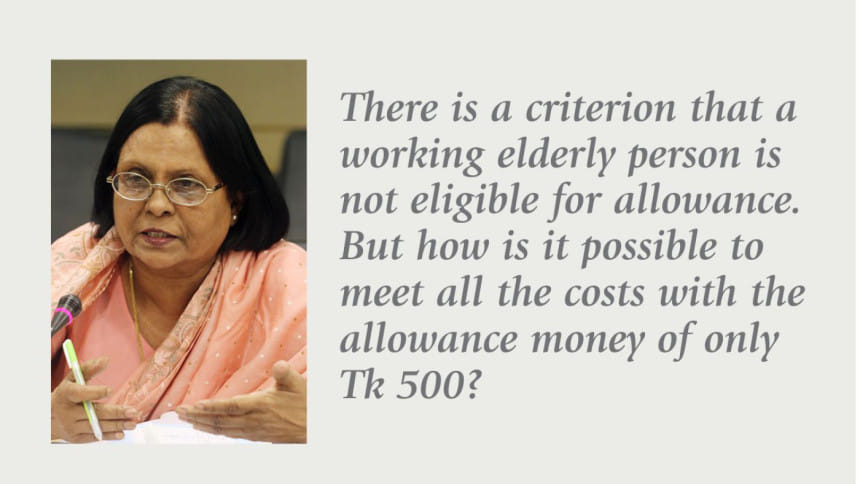
Sharifa Begum, Vice President, Forum for the Rights of Elderly People & Researcher
Under the existing system, only one person from a family gets elderly allowance. And there is no inheritance system in case of death of the person. As a result after the death of her husband the elderly wife becomes more vulnerable but does not get the allowance her husband used to get. Again, there is a criterion that a working elderly person is not eligible for allowance. But how is it possible to meet all the costs with the allowance money of only Tk 500? There are many such anomalies in the eligibility criteria. The government should immediately address these issues to make the social security programmes more effective. The best way to avoid these anomalies is to go for universal pension scheme.
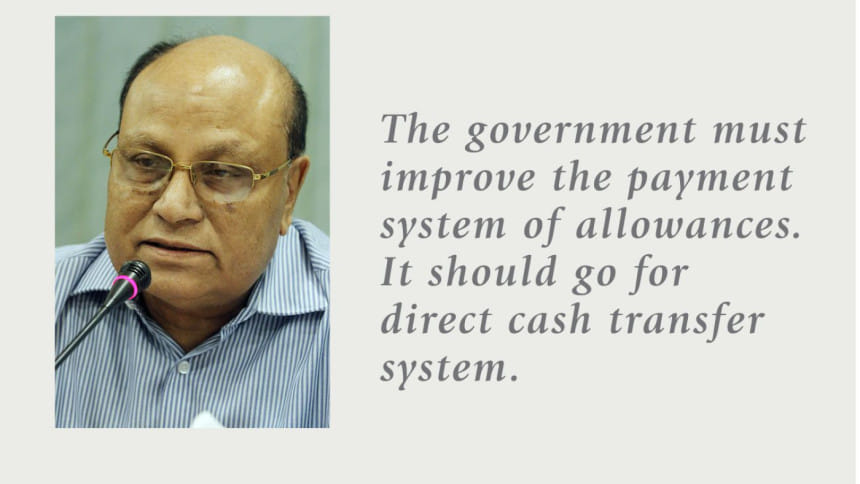
Siddiqur Rahman Choudhury, Team Leader, SPFMSP Project, Maxwell Stamp
The government can start the universal pension scheme by providing allowance to all the elderly people of the fifty poorest upazilas in the country. The government must improve the payment system of allowances. It should go for direct cash transfer system. Currently, the government is providing stipends at the primary education level directly to the parents.
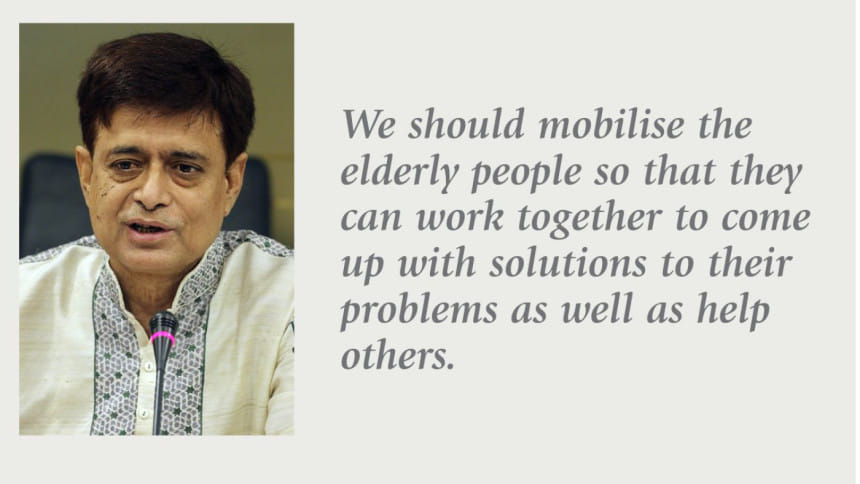
Abul Hasib Khan, Executive Director, RIC & Co-Convenor, NFSP
We should mobilise the elderly so they are more aware of their rights. They can then work together to come up with solutions to their problems as well as help others. For example, in Gazipur, the elderly themselves prepare the list of the beneficiaries of old age allowance and submit it to the local administration. They also monitor distribution of the allowances. A few years back, they urged the local Sonali Bank to build a shade and toilet at the premises of the bank, and the bank authorities built it. There are 13 standing committees in every Union Parishad on various issues. There should be another committee for the elderly which will mobilise the senior citizens of the area. It will be a great support for the local administration.
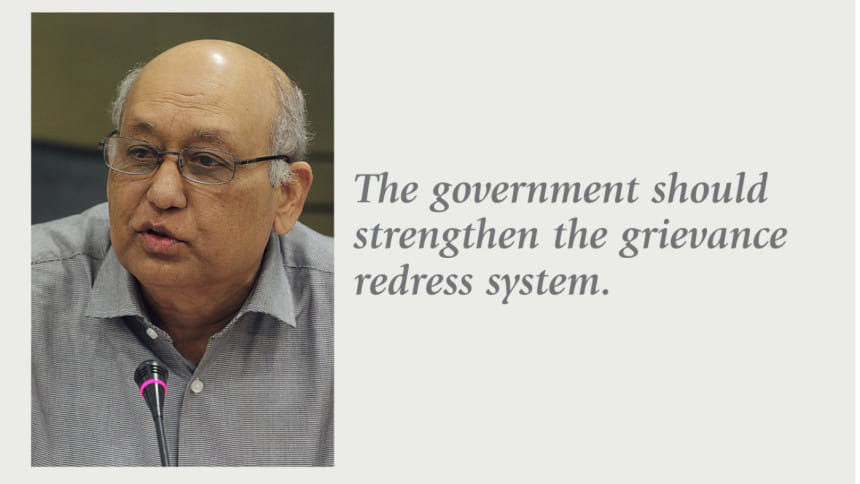
Mohsin Ali , Executive Director, WAVE Foundation & Member, NFSP
The government should strengthen the grievance redress system. It should also update the database on a regular basis. Finally, the government should increase old age allowance by a reasonable amount.
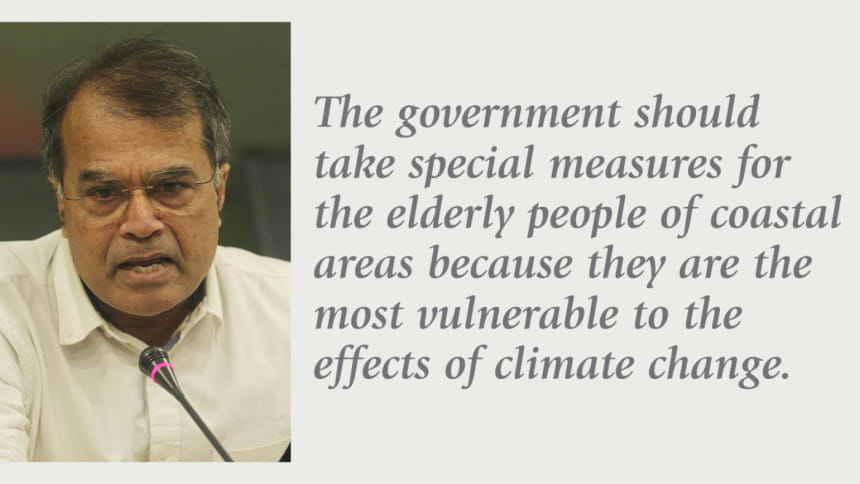
Rezaul Karim Chowdhury, Executive Director, Coast Trust & Member NFSP
In the coastal areas, particularly in island areas, the communication system is very poor. The local banks are far away from the islands. Most of the local government representatives of these areas live in towns. I would recommend the government take special measures for the elderly people of these areas because they are the most vulnerable to the effects of climate change.
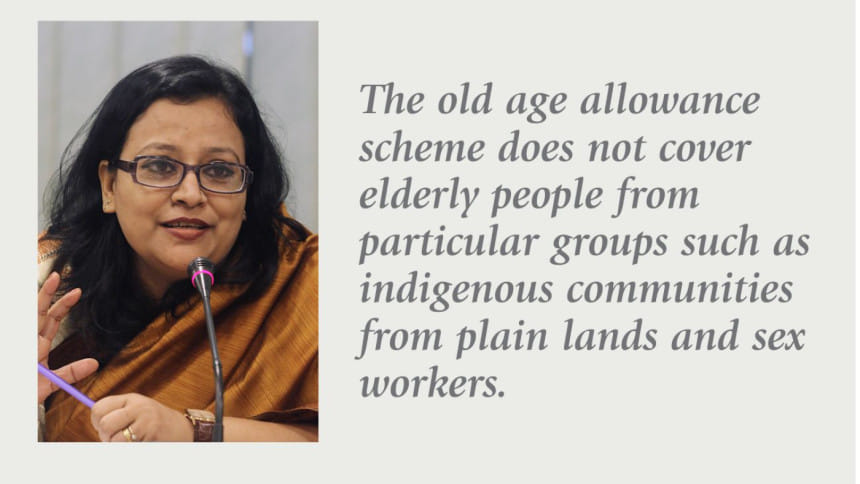
Rabeya Sultana, Interim Country Director, HelpAge International Bangladesh & Member, NFSP
The government should seriously consider the proposal of introducing universal pension facilities for people aged above 70 or 75. The old age allowance scheme does not cover elderly people from particular groups such as indigenous communities from plain lands and sex workers. The government should look into this issue seriously.
The old age allowance programmes are mainly focused on rural areas. At the current pace of urbanisation the number of poor elderly persons residing in urban areas is growing rapidly. We should include these people in the social security schemes.
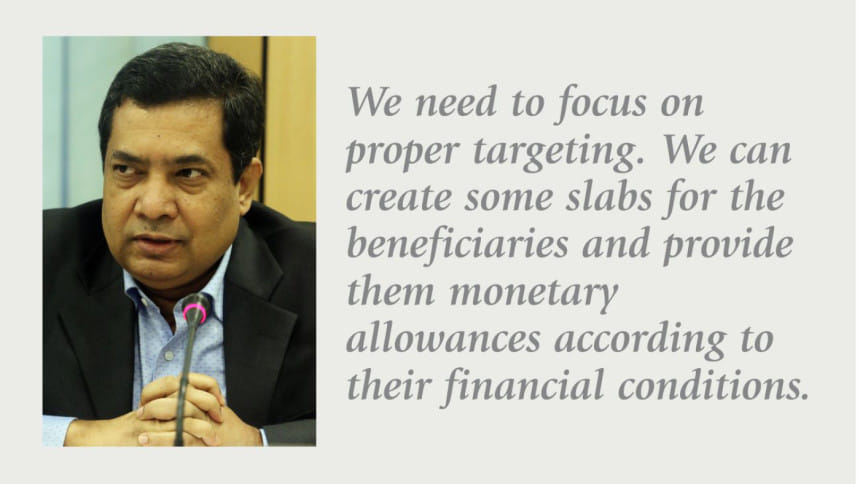
Monzur Hossain, Senior Research Fellow, BIDS
The research findings presented in today's seminar have solely focused on the demand side. We should consider the problems on the supply side as well. Most of the local government institutions suffer from resource scarcity and lack of adequate manpower. It is really difficult for them to carry out the process of classification of the poor properly. That's why we need to strengthen the local government bodies. We need to activate the ward committees and standing committees. Local NGOs and civil society organisations should also be involved in the data collection and selection process of the beneficiaries.
At present the universal pension scheme is not feasible. We need to focus on proper targeting. We can create some slabs for the beneficiaries and provide them monetary allowances according to their financial conditions.
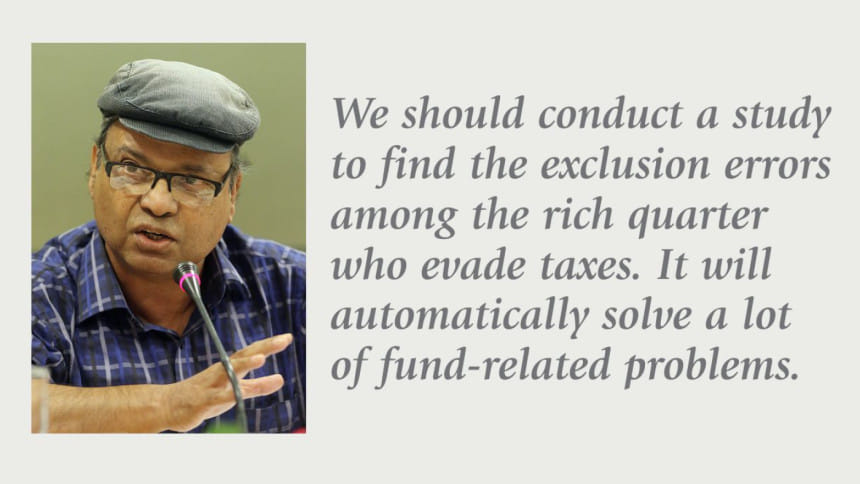
MM Akash, Professor, Economics Department, University of Dhaka
I fully agree with the suggestion that self-selection is the best selection process. The elderly people should be given the responsibility of preparing the list of the beneficiaries of old age allowance. The local administration will only facilitate the process.
Initially the universal pension scheme can be started by the voluntary involvement of young people who will deposit a certain amount of money for their future. The government will supplement this fund.
We always talk about inclusion and exclusion error of the poor. We should conduct a study to find the exclusion errors among the rich quarter who evade taxes. It will automatically solve a lot of fund-related problems.
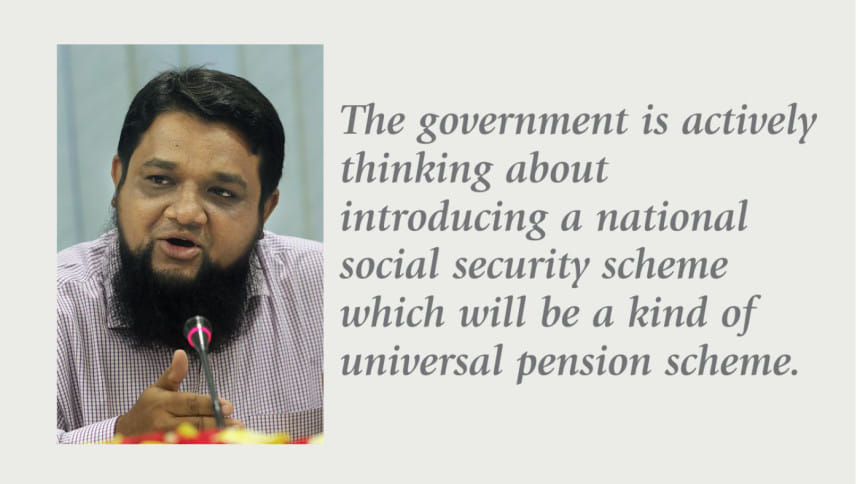
Md. Ashfaqul Amin Mukut, Deputy Secretary, Cabinet Division
The National Social Security Strategy has already started working on various recommendations floated in today's seminar. The strategy suggests separate amount of allowance for various age groups among elderly people. For example, it suggests Tk 3,000 for people aged 90 or above.
The government is actively thinking about introducing a national social security scheme which will be a kind of universal pension scheme. Now they are preparing a policy structure for it.
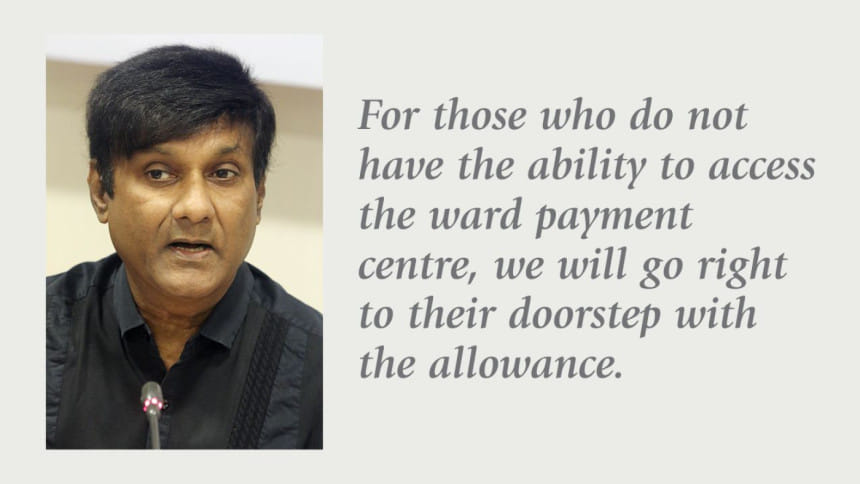
Gazi Mohammad Nurul Kabir, DG, Dept. of Social Services
We have started the digitisation process from selection point up to payment. We are now doing various pilot projects before embarking on the robust financial inclusion scheme. We have already paid 30,000 recipients digitally. We have also enrolled 18,000 new recipients through Union Digital Centres (UDCs). We are taking the payment system up to the ward level. For those who do not have the ability to access the ward payment centre, we will go right to their doorstep with the allowance.
We are also planning to introduce a graduation scheme through which elderly people along with people with disability and widows will get the opportunity to utilise their capacity and earn money.
We have already completed a large part of the MIS work. Now we have disaggregated data of 35 lakh people. The Social Services Department has 16 open groups on Facebook which anyone can access and interact with us.
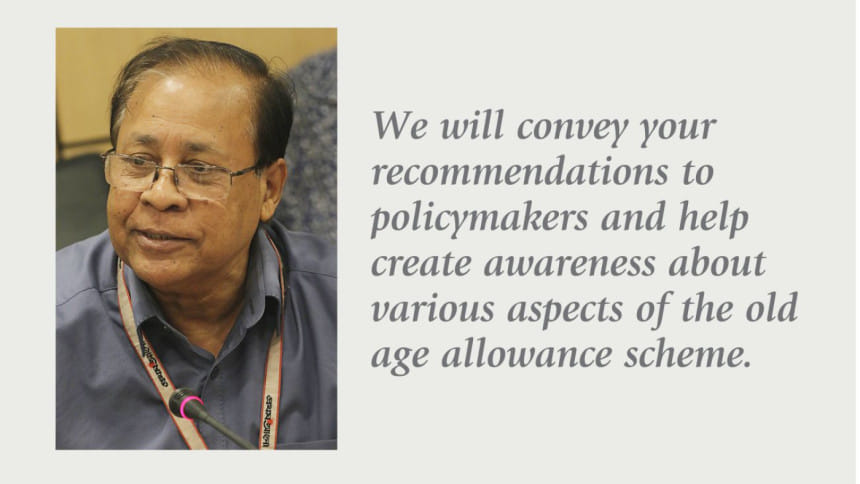
Abdul Quayum, Associate Editor, Prothom Alo
I want to thank all the participants for their excellent contributions to today's discussion. As part of the media we will convey your recommendations to policymakers and help create awareness about various aspects of the old age allowance scheme.
RECOMMENDATIONS
♦ National Identity Card should be made compulsory for identifying the age of the beneficiaries.
♦ The government should gradually move towards implementing universal pension scheme.
♦ Currently, an elderly person who has land amounting to 0.5 acre or 50 decimal or less will be eligible for old age allowance. But we need to consider the fact that there is a considerable difference in the price of land in rural and urban areas.
♦ The selection process of the beneficiaries should be conducted in an open place and the local people should be informed about it. Union Parishads should also be given adequate time and financial support to conduct the selection process properly.
♦ The amount of allowance should be increased. There can be gradation according to a beneficiary's location in urban or rural areas. We recommend special allowance for people above 80 years of age.
♦ Family income of elderly persons needs to be calculated along with their individual income in determining eligibility for old age allowance.
♦ The government should try to make the payment system smooth and hassle-free and gradually move towards direct transfer system. The government can declare a bank calendar for disbursement of the allowance. New financial institutions can also be involved here. The post office can be a good option in this regard.
♦ Data of beneficiaries should be preserved digitally. There should be union-based database of beneficiaries of various social security projects.
♦ The local committees should be given the maximum authority to select the beneficiaries without political intervention.
♦ Regular monitoring and evaluation of these social security programmes are needed.
♦ The grievance redress system should be instituted up to the lowest level of local administration.

 For all latest news, follow The Daily Star's Google News channel.
For all latest news, follow The Daily Star's Google News channel. 



Comments